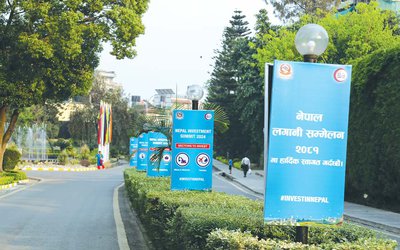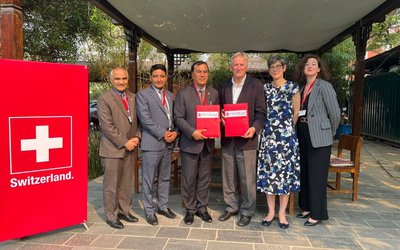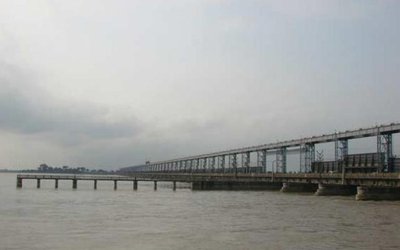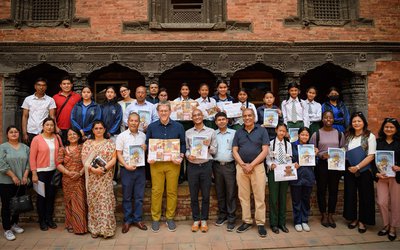Nepal is an agriculture-based country. Some 80 % Nepalese are engaged in farms. Only a portion of agriculture, however, is organic. The Three Year Interim Plan (TYIP: 2007/08-2009/10) of the government of Nepal describes the need to secure Nepal’s access to the international markets by increasing the credibility of its organic products. Organic Agriculture in Nepal is clearly a good hope for the country. Indigenous knowledge is available in this sector and this raises the prospects of economic empowerment.
However, the emphasis on organic agriculture at the programme level looks inadequate for its development and promotion. There is a virtual lack of government support to organic growers and marketers. It is found necessary that before the beginning of the cultivation of organic crops, their marketability, and that too at a premium over the traditional and modern products, has to be assured. Mass production of organic products and the business volume for market sale are still invisible. The research work on processing and certification are weak and, in many cases, are missing.
The current situation is that haphazard use of chemical fertilizers and pesticides have been causing soil degradation and desertification. As a result, decline in crop production, ecological imbalance, severe health hazards on humans and animals, loss of indigenous variety and biodiversity are emerging as major problems. Regular use of pesticides and chemicals is causing them not to respond to production. Many insects and diseases have become resistant to chemical pesticides. Small farmers are facing not only non-affordable and unreliable high cost external inputs but also counterfeit chemical inputs.
Poor technical skills and capacity in managing complex problem in the farm land, insufficient organic technology to support production, lack of research on processing and certification, poor investment capacity, small and fragmented land holding, and less risk bearing capacity etc are the key constraints at the producers’ level. Poor consumers’ awareness about the organic products, quality and availability, lack of trust about the authenticity of the products, higher price of the products, impoverished market infrastructure are the constraints at marketers’ level.
The problems have been aggravated due to the combination of above factors coupled by the negative effect of climate change; e.g uneven and disturbed rainfall, drought, gradual rise in temperature and lack of conservation farming practices. As a result, decrease in crop yield and soil productivity has become a reality. Because of the above situation, majority of farmers in Nepal are poor, socially excluded and food insecure, always looking for alternatives. The situation demands low external-input eco-friendly agriculture technologies, particularly the organic agriculture, which is in the rising trend nationally and internationally.
Organic agriculture is a practice that does not use any chemical fertilisers, pesticides, growth regulators and genetically modified organisms (GMOs). In general, in livestock, hazardous food additives and medicines are excluded. This helps produce safe nutritious and quality food products together with maintaining ecological balance and its sustainability.
Broadly Organic agriculture in Nepal can be categorised into 3 types; Organic agriculture by nature, Organic agriculture in conversion and Organic agriculture.
These days, the niche market for organic products are steadily increasing particularly in the urban areas despite the fact that Organic products are a bit expensive compared to conventional products. The higher cost is mainly associated with compensation for the low crop yield during conversion period with an offer of 15-20 % extra price as premium price to the farmers, higher transportation cost while sourced into the urban areas from far remote areas and the cost of certification.
The national certifying body such as the organization like Organic Certification Nepal (OCN) have also been established as a certifier and have started working. Similarly the national network organization such as Nepal Permaculture Group (NPG) and the private sector like Organic World and Fair Future (OWF), Organic Village etc are aggressively involved in promotion and marketing of organic products. The organic campaign is gaining momentum. To this context it is essential to launch inclusive business model based on fair trade principles so that producers, traders, super marketers and consumers will have a win-win situation. To speed up the movement further, the government should actively partner and cooperate with various agencies involved in organic agriculture, a private public partnership should be effectively promoted without any hesitation. Importantly the state should develop a clear vision with a long term plan about what commodities should be focused on and how the country should start converting the farm land into organic on a phase wise basis. It is essential to find out which products should be based on domestic and international market. The possibility of linking organic agriculture with Agro eco tourism should also be explored.
In conclusion, organic farming holds out a big prospect in the Nepalese context. Coordinated efforts among the actors is essential to boost it by meeting the challenges on the way to its development. Policy environment, private public partnership with inclusive business adapting to fair trade principles and clear long term vision and plan are vital including research, extension, market development and commercialization to this sector.
(The author of this article is the chairman of Organic World and Fair Future (OWF) and can be contacted at email; umesh.lama@yahoo.com)
- TANAHU HYDROPOWER PROEJCT: A Significant Achievement
- Apr 15, 2024
- AMBASSADOR HANAN GODAR: Sharing Pain With A Nepali Family
- Mar 30, 2024
- VISIT OF KfW AND EIB TO NEPAL : Mission Matters
- Mar 25, 2024
- NEPAL BRITAIN SOCIETY: Pratima Pande's Leadership
- Mar 24, 2024
- NEPAL ARMY DAY: Time To Recall Glory
- Mar 15, 2024
















